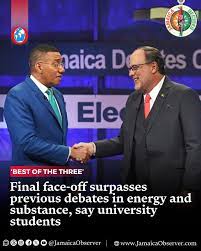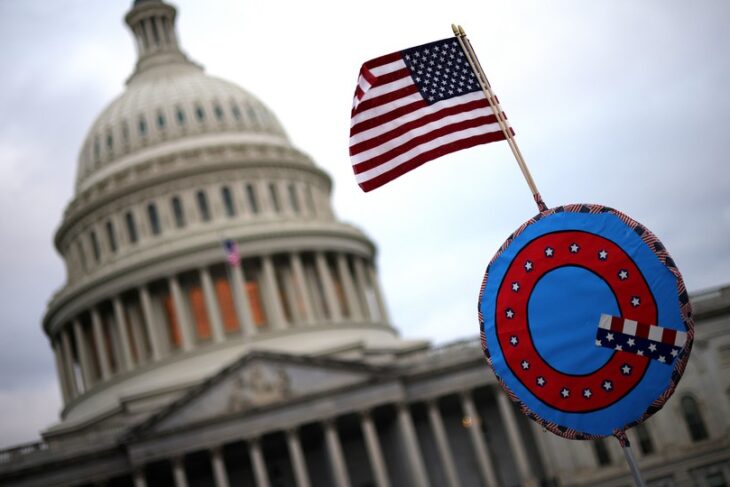
On Thursday, August 28, 2025, like many Jamaicans here in the diaspora, along with the numerous Jamaicans who were camped out around their television sets, their radios, their computer desktops, their laptops, their tablets, and their smartphones, at ground zero, to bear witness to the political debate between Prime Minister Dr. Andrew Holness of the Jamaica Labour Party, and the Leader of the Opposition Mr. Mark Golding of the People’s National Party, so did this writer.
Not only did I watch the debate on my tablet via YouTube from the beginning to the cordial handshakes at the end, I also followed the post-debate discussion by panelists on the local Jamaican media outlet which facilitated the airing of the debate. I was extremely proud of what I had witnessed from both candidates running for high office, although many on “The Rock” might have had a more jaded, and a more ho-hum experience than I had.
Some may have said, “What the candidates said, with their various charges and counter charges, have all been heard before for quite a few years now, and so, we heard nothing new. And what does it matter as, outside of those who are as of yet, undecided, most people have already made up their minds and are, thus, expected to vote accordingly.
As one in the diaspora, I defer to such opinions, as they who live on “The Rock” 24 hours a day, seven days a week, and 365 days of every year know what they are talking about. Out of their “lived experiences” they can boldly say, “He who feels it knows it.” But as one who has participated in both the Jamaican and the American electoral process, please forgive my exuberance and humour me, especially in light of what transpired here in the United States in November of last year, leading up to the present, 2025, and in the months before the general election of last year. As a devotee to the principles of liberal democracy, with all of its imperfections, I still celebrate what I had witnessed on stage on August 28th.
There is an old proverb which originated from Jamaican and African traditions which states that, “A cow never knows the use of its tail until it loses it”. It means, in rather simple terms, that one does not appreciate the value of something until one no longer has it. It highlights that a person often takes for granted the good things or the good people in one’s life until they are gone, similar to how a cow does not realize the importance of its tail for swatting flies and for other functions until it is no longer in use.
For all of their shortcomings, both the Prime Minister and the Leader of The Opposition had conducted themselves with eloquent, if not, passionate dignity, befitting men who sought to market themselves to the Jamaican populace, and, indeed to the world at large, as the best person to lead the country. Harsh things were said of their characters and of their performance and that of their respective political parties. That, as history can verify, has often been the nature of passionate and of healthy political debates in liberal democracies. And both men, despite accusations of corruption, had set an example for our politicians here in the United States, a country which markets itself as the bastion and great defender of liberal democracy. As one, Joseph Joubert once said, “It is better to debate a question without settling it than to settle a question without debating it.” This is wisdom that Americans have forgotten.
I wrote and published an article back in 2023, which I believe underscores the value of Joubert’s statement, and the sheer folly for outrightly eschewing and callously mocking it. For all their character flaws and for all of their political missteps, my stated admiration for both debaters still stands. I will end this opinion piece, with excerpts from that opinion piece which was published in 2023. Although they were published over two years ago, I believe that they will help to underscore the points that I have been trying to make about the Jamaican debate of August 28th.
“Wednesday night, August 23, 2023, many Americans gathered around their television sets to witness the first in a series of Republican presidential primary debates towards the party’s nomination for the 2024 campaign. Former President Trump, as it presently stands, is the leading contender, being head and shoulders over his contenders in the public opinion polls. Mr. Trump decided not to participate, despite being bated and shamed into doing so by his peers. And, why should he have? He is not only the frontrunner at the moment, but many of his supporters do not seem to care about what could be considered, by traditional political standards, as detailed, as well reasoned and as pragmatic political platforms. In fact, Mr. Trump’s absence from the debate in question only underscored the lack of interest by many in the GOP for any clear and workable democratic policies, by conservative standards, since as far back as the debates of 2016, if one could really call them debates.
Some in society were led to believe then that they were, in all reality, anything but bonafide political debates. The candidate who won the GOP presidential primary then received high marks for his charismatic appeal, one laced with insults, innuendos, put-downs and with cold, crass, and seedy caricatures of, for examples, minorities, women, Muslims, Mexicans, Africans and undocumented workers. He won, in all actuality, without debating, and with the support of white supremacy groups, who, in a presidential debate, when asked to denounce them, instructed them on national television to ‘Stand back and stand by’. And so, what other dynamics were at play outside of normal political discourse?
The word debate, according to one dictionary, is defined as a formal discussion on a particular topic in a public meeting or legislative assembly, in which opposing arguments are put forward. It also drew a distinction between what is considered an argument and a debate. A debate is formal, deliberate, and executed according to an agreed upon set of rules. Debates use arguments, but an argument itself is informal, usually unplanned, and can get heated. The GOP presidential debates of 2016 saw participants breaking those basic rules. Three notable standouts who were caught up in a melee of accusations and of character assassination were Senator Marco Rubio of Florida, Senator Ted Cruz of Texas, and businessman Mr. Donald Trump of New York.
The main culprit and catalyst of discord on stage was Mr. Trump himself. He broke, practically, every rule in respect to what one should never say or do during a debate. He attacked his fellow debaters. He often generalized and exaggerated. He was rude. He was disrespectful. He often interrupted others. He reeked of sarcasm, and he exuded an air of a ‘know-it-all’, claiming to be able to accomplish things without substantive arguments. And yet, despite his unstatesmanlike boorishness and his patent demagoguery, he was considered by many in his party to be the winner. How so?
The candidates at the various stages of the 2016 series of debates, generally speaking, had carefully thought out political platforms which revealed what they would have done, adhering to what was regarded as established Republican conservative ideals both in domestic and in foreign policy. In making their positions known, such individuals as governors Mike Pence, Jeb Bush and John Kasich, and also renowned neurosurgeon Dr. Ben Carson, showed themselves to be gentlemen and exemplars of debate. Whether one agreed or disagreed with their positions, one could follow the logic of their arguments. The public had the opportunity to survey and review their positions in order to make well informed democratic choices. But the candidate who won, as was stated before, was he who often deflected and who obfuscated when probing questions were directed at him by members on the panel of moderators, and by those who stood on the platform with him.”
As I began this opinion piece in tones of my Jamaican heritage, so end I it now by saying: “Jack Mandora, Me Nuh Choose None”, (which is an ending statement for Jamaican Anansi stories). We, here in the United States of America did not get the benefit of such sanity as I had witnessed on the debate stage of August 28th. We are now living a series of American Anansi stories, similar to those told here of Brer Rabbit.



